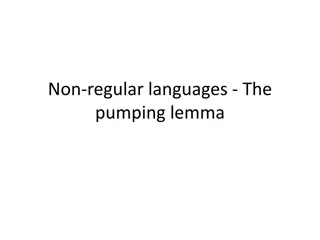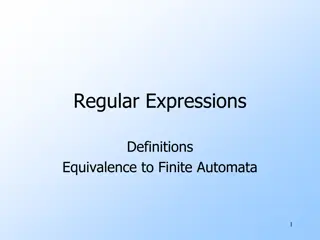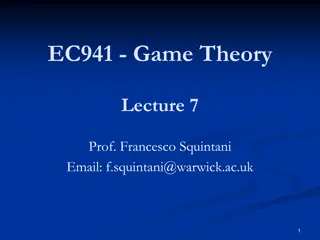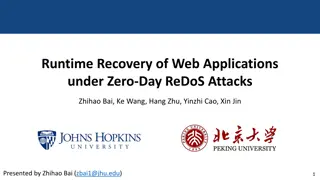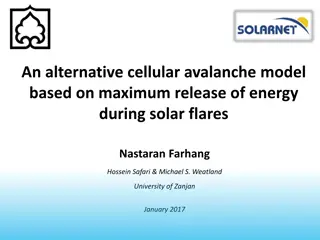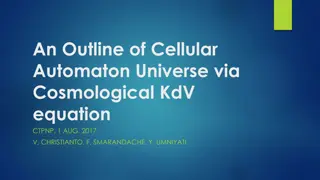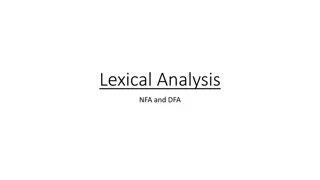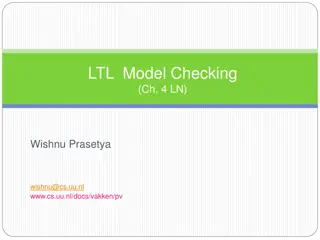Non-Regular Languages and the Pumping Lemma
Dive into the world of regular and non-regular languages, exploring the concept of the pumping lemma. Learn about different types of non-regular languages and why some languages require an infinite number of states to be represented by a finite automaton. Find out why mathematical proofs are essenti
2 views • 62 slides
Equivalence of Regular Expressions and Finite Automata
Regular expressions are an algebraic method to describe languages, specifically the regular languages. They are defined recursively based on symbols and operations such as concatenation and closure. Precedence rules and examples are also provided. The equivalence between regular expressions and fini
10 views • 25 slides
Game Theory Lecture 7: Repeated Games and Equilibria
Exploring the concept of repeated games in game theory, this lecture covers infinitely repeated games, Nash and subgame-perfect equilibria, strategies, a Grim Trigger Strategy in the Prisoner's Dilemma, and automaton representation. Understanding how interactions evolve over time offers insights int
3 views • 45 slides
Runtime Recovery of Web Applications under Zero-Day ReDoS Attacks
This detailed content discusses the critical issue of Runtime Recovery of Web Applications facing Zero-Day ReDoS Attacks. It delves into the significance of regular expressions (regex) in handling HTTP requests, highlighting vulnerabilities and real-world impacts. The research emphasizes the severit
4 views • 31 slides
Alternative Cellular Avalanche Model for Solar Flares
Exploring an alternative cellular avalanche model based on the maximum release of energy during solar flares, this research delves into optimizing models to study the quasi-static evolution of coronal magnetic fields. Through a series of image objects and studies, the study presents various cellular
4 views • 16 slides
Insight into Cellular Automaton Universe and Cosmic Sound Wave
This concept paper offers new insight into modeling cosmology through a Cellular Automaton Universe, discussing quantization in astronomy, the definition and application of cellular automata, and the possibility of using solitons to model the cosmic sound wave. Diving into the realms of astrophysics
0 views • 24 slides
Lexical Analysis
Regular Expressions (REs) play a crucial role in describing regular languages, with the ability to convert any RE into a Deterministic Finite Automaton (DFA). This conversion enables the automation of lexical analysis, a fundamental aspect of language processing. Explore the implementation of REs th
0 views • 34 slides
Probabilistic Automaton and Its Applications
Explore the concept of probabilistic automaton, its extensions, and how it is utilized in modeling asynchronous systems, communication protocols, and more. Learn about stochastic languages, distributions over strings, and the practical uses of probabilistic automata.
1 views • 21 slides
Overview of LTL Model Checking and Program Verification
This overview delves into the abstract models of programs, temporal properties verification through model checking, runtime properties like Hoare triples, linear temporal logic, finite state automaton abstraction, program composition modeling, intersection concept, and parallel composition in the co
3 views • 59 slides
CLR(1) Parsing Tables and LR(1) Automaton
Explore the construction of CLR(1) parsing tables, LR(1) sets of items, LR(1) versus SLR parser, and review of LR(1) automaton. Learn why LR(1) parsers are preferred over SLR parsers despite the trade-offs involved.
5 views • 25 slides
Automata Approaches for Palindromic Subsequence Problems
Explore palindromic subsequence automata and the longest common palindromic subsequence in computational mathematics, featuring efficient algorithms and a novel weighted finite automaton for solving the problem. The paper presents PSA construction and discusses the input alphabet and transition func
2 views • 19 slides
Theory of Computation 2025: Understanding Deterministic Finite Automaton
Explore the fundamentals of deterministic finite automata in the context of theory of computation, including formal definitions, state diagrams, and language acceptance criteria.
2 views • 23 slides
Understanding LR(0) Parser: States, Construction, and Tables
Dive into the LR(0) parser in the context of deterministic grammars, exploring the states of the automaton, the process of building LR(0) states, adding states, constructing a predictive parsing table, and more. Learn how LR(0) parsing works and its practical applications in information technology.
2 views • 9 slides
Understanding Compiler Principles and Lexical Analysis
Delve into the world of compiler principles with a focus on lexical analysis, parsing, abstract syntax, and semantic analysis. Explore the concept of finite automata and deterministic finite automaton (DFA) in the context of computer programming.
0 views • 46 slides
Buchi Automaton Construction
Learn how to convert Linear Temporal Logic (LTL) formulas to Buchi automata step by step. Understand the concept of observations, consistency, and maximality in constructing Buchi automata. Visual examples provided for better understanding.
2 views • 17 slides
Universal Turing Machines & Computer Programs Overview
Gain insights into universal Turing machines, undecidable problems, and universal computations. Learn about Python execution, universal programs, and the rule 110 automaton - all essential components in the realm of computational theory.
0 views • 14 slides
Binary Strings Third Position DFA
Explore how to construct a Deterministic Finite Automaton (DFA) for the language of binary strings with a 1 in the third position from the end. Understand the construction process involving the cross-product construction and the necessary considerations while designing the DFA.
1 views • 57 slides
